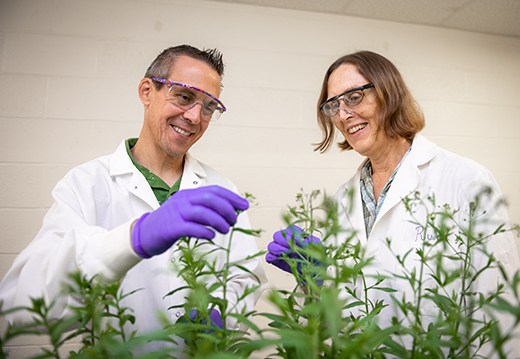K-State scientists receive collaborative grant to advance biofuel production and agricultural economy
Wednesday, Nov. 16, 2022

Timothy Durrett, associate professor of biochemistry and molecular biophysics, and Ruth Welti, university distinguished professor of biology, received a grant from the U.S. Department of Energy for the advancement of biofuel production. | Download this photo.
MANHATTAN — Kansas State University researchers are part of a five-year collaborative grant from the U.S. Department of Energy to improve oilseed crops for use as biofuels and other bioproducts.
Timothy Durrett, associate professor of biochemistry and molecular biophysics, and Ruth Welti, university distinguished professor of biology, received nearly $1.9 million to better understand how changing the biochemistry of oilseed plants alters their oil production.
The research group is working with camelina and pennycress — non-food oilseed crops — that can be used as cover crops by farmers. Durrett says these plants have not benefited from the breeding that has increased yield in other crops. This research will help scientists better understand how the plants synthesize fatty acids to make lipids while also improving oil production and crop profitability.
As part of the collaboration, Durrett is working to more efficiently produce transgenic plants. Current research methods alter the biochemistry of plants at random places within their DNA and Durrett hopes to make the genetic engineering process more predictable and efficient.
"We will implement cutting-edge plant synthetic biology," Durrett said. "If we can insert the genetic changes in the same spot every time, it makes testing the effect that much easier. By understanding fundamental plant biochemical concepts, we can then apply these to other plant species as well."
Welti, director of the Kansas Lipidomics Research Center at K-State, is analyzing how the oils are changing in the altered plants.
"In my lab, I can get a snapshot of how the plants are responding to changes that are being introduced genetically," Welti said. "This project will really help scientists understand the overall principles and rules of fatty acid and oil production in oilseed plants."
The researchers stressed that camelina and pennycress can be integrated into a traditional rotation and do not interfere with food production.
"If we are making biofuels or bioproducts, we don't want to compete with food production," Durrett said. "A cover crop by itself it will protect the soil from wind and runoff, but with these oilseed crops farmers also earn additional income."
The project's principal investigator is Edgar Cahoon, the George W. Holmes professor of biochemistry at the University of Nebraska, Lincoln. The project team also includes researchers from University of Colorado, Boulder, Washington State University, Montana State University, University of Minnesota, University of Missouri and the Donald Danforth Plant Science Center.
